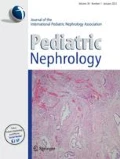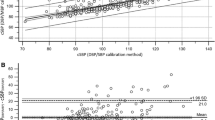Abstract
Background
The metabolic syndrome (MS) has reached epidemic proportions worldwide. This syndrome is associated with cardiovascular risk factors, including functional and structural cardiac and vascular changes. The aim of our study was to evaluate subclinical atherosclerosis and its associated risk factors in children with MS.
Methods
The study cohort comprised 52 children with MS and 38 age- and sex-matched healthy children. The diagnosis of MS was made according to criteria adopted by the World Health Organization. Blood pressure based on 24-h ambulatory blood pressure monitoring (ABPM), carotid intima-media thickness (cIMT), carotid distensibility coefficient (DC) and flow-mediated endothelium-dependent dilation (EDD) were assessed in all children.
Results
We found a significantly higher cIMT in children with MS than in healthy children, but carotid DC and flow-mediated EDD were lower in the former. Multivariate analysis revealed that a higher cIMT was independently associated with a higher nighttime systolic blood pressure (SBP) and lower high-density lipoprotein-cholesterol (β = 0.386, p = 0.011 and β = 0.248, p = 0.042, respectively). Also, higher nighttime SBP remained an independent predictor of lower DC (β = 0.495, p = 0.009), and higher 24-h SBP was the only independent predictor for a lower EDD (β = 0.532, p = 0.004).
Conclusions
Atherosclerotic vascular changes were common among our pediatric patients with MS and easily determined by high-resolution ultrasound imaging. In particular, subclinical atherosclerosis was clearly associated with nocturnal or 24-h systolic hypertension as measured by ABPM. We therefore recommend that subclinical vascular changes and AMBP measurements should be used as diagnostic markers to predict atherosclerotic risks in this pediatric patient group.
Similar content being viewed by others
References
Zimmet P, Alberti KG, Kaufman F, Tajima N, Silink M, Arslanian S, Wong G, Bennett P, Shaw J, Caprio S, IDF Consensus Group (2007) The metabolic syndrome in children and adolescents—an IDF consensus report. Pediatr Diabetes 8:299–306
Weiss R, Dziura J, Burgert TS, Tamborlane WV, Taksali SE, Yeckel CW, Allen K, Lopes M, Savoye M, Morrison J, Sherwin RS, Caprio S (2004) Obesity and the metabolic syndrome in children and adolescents. N Engl J Med 350:2362–2374
Berenson GS (2002) Childhood risk factors predict adult risk associated with subclinical cardiovascular disease. The Bogalusa Heart Study. Am J Cardiol 90:3–7
Litwin M, Sladowska J, Syczewska M, Niemirska A, Daszkowska J, Antoniewicz J, Wierzbicka A, Wawer ZT (2008) Different BMI cardiovascular risk thresholds as markers of organ damage and metabolic syndrome in primary hypertension. Pediatr Nephrol 23(5):787–796
National High Blood Pressure Education Program Working Group on High Blood Pressure in Children and Adolescents (2004) The fourth report on the diagnosis, evaluation and treatment of high blood pressure in children and adolescents. Pediatrics 114:555–576
de las Fuentes L, Brown AL, Mathews SJ, Waggoner AD, Soto PF, Gropler RJ, Dávila-Román VG (2007) Metabolic syndrome is associated with abnormal left ventricular diastolic function independent of left ventricular mass. Eur Heart J 28(5):553–559
Bostanci BK, Civilibal M, Elevli M, Duru NS (2012) Ambulatory blood pressure monitoring and cardiac hypertrophy in children with metabolic syndrome. Pediatr Nephrol 27:1929–1935
Grundy SM, Cleeman JI, Daniels SR, Donato KA, Eckel RH, Franklin BA, Gordon DJ, Krauss RM, Savage PJ, Smith SC Jr, Spertus JA, Costa F (2005) Diagnosis and management of the metabolic syndrome: an American Heart Association/National Heart, Lung, and Blood Institute scientific statement. Circulation 112:2735–2752
Alberti KG, Zimmet PZ (1998) Definition, diagnosis and classification of diabetes mellitus and its complications. Part 1: diagnosis and classification of diabetes mellitus provisional report of a WHO consultation. Diabet Med 15:539–553
Bundak R, Furman A, Gunoz H, Darendeliler F, Bas F, Neyzi O (2006) Body mass index references for Turkish children. Acta Pediatr 95:194–198
Wuhl E, Witte K, Soergel M, Mehls O, Schaefer F (2002) For the German Working Group on Pediatric Hypertension. Distribution of 24-h ambulatory blood pressure in children: normalized reference values and role of body dimensions. J Hypertens 20:1995–2007
Flynn JT, Daniels SR, Hayman LL, Maahs DM, McCrindle BW, Mitsnefes M, Zachariah JP, Urbina EM, on behalf of the American Heart Association Atherosclerosis, Hypertension and Obesity in Youth Committee of the Council on Cardiovascular Disease in the Young (2014) Update: Ambulatory Blood Pressure Monitoring in Children and Adolescents: A Scientific Statement From the American Heart Association. Hypertension. doi:10.1161/HYP.0000000000000007
Stein JH, Korcarz CE, Hurst RT, Lonn E, Kendall CB, Mohler ER, Najjar SS, Rembold CM, Post WS, American Society of Echocardiography Carotid Intima-Media Thickness Task Force (2008) Use of carotid ultrasound to identify subclinical vascular disease and evaluate cardiovascular disease risk: a consensus statement from the American Society of Echocardiography Carotid Intima-Media Thickness Task Force. Endorsed by the Society for Vascular Medicine. J Am Soc Echocardiogr 21:93–111
Doyon A, Kracht D, Bayazit AK, Deveci M, Duzova A, Krmar RT, Litwin M, Niemirska A, Oguz B, Schmidt BM, Sözeri B, Querfeld U, Melk A, Schaefer F, Wühl E, 4C Study Consortium (2013) Carotid artery intima-media thickness and distensibility in children and adolescents: reference values and role of body dimensions. Hypertension 62:550–556
Celermajer DS, Sorenson KE, Gooch VM, Spiegelhalter DJ, Miller OI, Sullivan ID, Lloyd JK, Deanfield JE (1992) Non-invasive detection of endothelial dysfunction in children and adults at risk of atherosclerosis. Lancet 340:1111–1115
Klein S, Burke LE, Bray GA, Blair S, Allison DB, Pi-Sunyer X, Hong Y, Eckel RH, American Heart Association Council on Nutrition, Physical Activity, and Metabolism (2004) Clinical implications of obesity with specific focus on cardiovascular disease: a statement for professionals from the American Heart Association Council on Nutrition, Physical Activity, and Metabolism: endorsed by the American College of Cardiology Foundation. Circulation 110:2952–2967
Denarié N, Gariepy J, Chironi G, Massonneau M, Laskri F, Salomon J, Levenson J, Simon A (2000) Distribution of ultrasonographically-assessed dimensions of common carotid arteries in healthy adults of both sexes. Atherosclerosis 148:297–302
Simon A, Gariepy J, Chironi G, Megnien JL, Levenson J (2002) Intima-media thickness: a new tool for diagnosis and treatment of cardiovascular risk. J Hypertens 20:159–169
Meyer AA, Kundt G, Steiner M, Schuff-Werner P, Kienast W (2006) Impaired flow-mediated vasodilation, carotid artery intima-media thickening, and elevated endothelial plasma markers in obese children: the impact of cardiovascular risk factors. Pediatrics 117:1560–1567
Elkiran O, Yilmaz E, Koc M, Kamanli A, Ustundag B, Ilhan N (2013) The association between intima media thickness, central obesity and diastolic blood pressure in obese and owerweight children: A cross-sectional school-based study. Int J Cardiol 165:528–532
Flynn JT (2011) Ambulatory blood pressure monitoring in children: imperfect yet essential. Pediatr Nephrol 26:2089–2094
Rocchini AP, Key J, Bondie D, Chico R, Moorehead C, Katch V, Martin M (1989) The effect of weight loss on the sensitivity of blood pressure to sodium in obese adolescents. N Engl J Med 321:580–585
Landsberg L (1992) Obesity and hypertension: experimental data. J Hypertens Suppl 10:S195–S201
Hall JE (2003) The kidney, hypertension and obesity. Hypertension 41:625–633
Akyol B, Boyraz M, Aysoy C (2013) Relationship of epicardial adipose tissue thickness with early indicators of atherosclerosis and cardiac functional changes in obese adolescents with metabolic syndrome. J Clin Res Pediatr Endocrinol 5:156–163
Lee SH, Kim JH, Kang MJ, Lee YA, Won Yang S, Shin CH (2011) Implications of nocturnal hypertension in children and adolescents with type 1 diabetes. Diabetes Care 34:2180–2185
Krantz JS, MackWJ HHN, Liu CR, Liu CH, Kaufman FR (2004) Early onset of subclinical atherosclerosis in young persons with type 1 diabetes. J Pediatr 145:452–457
Civilibal M, Caliskan S, Oflaz H, Sever L, Candan C, Canpolat N, Kasapcopur O, Bugra Z, Arisoy N (2007) Traditional and “new” cardiovascular risk markers and factors in pediatric dialysis patients. Pediatr Nephrol 22:1021–1029
Civilibal M, Caliskan S, Adaletli I, Oflaz H, Sever L, Candan C, Canpolat N, Kasapcopur O, Kuruoglu S, Arisoy N (2006) Coronary artery calcifications in children with end-stage renal disease. Pediatr Nephrol 21:1426–1433
Tsioufis C, Stefanadis C, Antoniadis D, Kallikazaros I, Zambaras P, Pitsavos C, Tsiamis E, Toutouzas P (2000) Absence of any significant effects of circadian blood pressure variations on carotid artery elastic properties in essential hypertensive subjects. J Hum Hypertens 14:813–818
Lekakis JP, Zakopoulos NA, Protogerou AD, Papaioannou TG, Kotsis VT, Pitiriga VC, Tsitsirikos MD, Stamatelopoulos KS, Papamichael CM, Mavrikakis ME (2005) Arterial stiffness assessed by pulse wave analysis in essential hypertension: relation to 24-h blood pressure profile. Int J Cardiol 102:391–395
Canpolat N, Kasapcopur O, Caliskan S, Gokalp S, Bor M, Tasdemir M, Sever L, Arisoy N (2013) Ambulatory blood pressure and subclinical cardiovascular disease in patients with juvenile-onset systemic lupus erythematosus. Pediatr Nephrol 28:305–313
Author information
Authors and Affiliations
Corresponding author
Rights and permissions
About this article
Cite this article
Civilibal, M., Duru, N.S. & Elevli, M. Subclinical atherosclerosis and ambulatory blood pressure in children with metabolic syndrome. Pediatr Nephrol 29, 2197–2204 (2014). https://doi.org/10.1007/s00467-014-2836-1
Received:
Revised:
Accepted:
Published:
Issue Date:
DOI: https://doi.org/10.1007/s00467-014-2836-1




